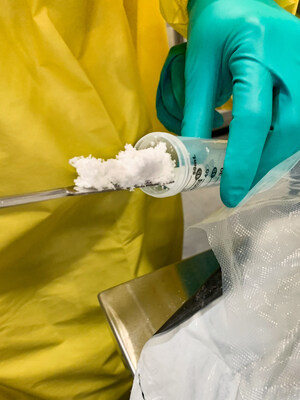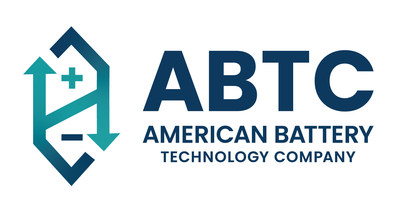American Battery Technology Company Successfully Manufactures Lithium Hydroxide from its First-of-Kind, Nevada-Based Claystone Integrated Demonstration Facility
American Battery Technology Company (NASDAQ:ABAT) successfully manufactured lithium hydroxide at its demonstration facility in Nevada using proprietary processing technologies. This development reduces the U.S. reliance on foreign lithium resources. The company aims to secure long-term commercial-scale offtake agreements with strategic partners and plans to accelerate the construction of a DOE-supported 30,000 MT/year lithium hydroxide refinery. The Tonopah Flats Lithium Project, one of the largest lithium deposits in the U.S., will be the location for this refinery. The initiative aims to support the North American critical battery minerals supply chain. ABTC also focuses on lithium-ion battery recycling technologies at its facility in Storey County, Nevada, enhancing its battery materials circular supply chain.
- Successfully manufactured lithium hydroxide from U.S. resources.
- Reduction of U.S. reliance on foreign lithium sources.
- Plans for a DOE-supported 30,000 MT/year lithium hydroxide refinery.
- Strategic partnerships for long-term offtake agreements.
- Large-scale lithium production supporting North American supply chain.
- Received a $57.5 million grant from the U.S. DOE for the refinery project.
- Engaged Black & Veatch for refinery construction.
- Developed proprietary lithium processing technologies.
- Lithium-ion battery recycling processes with high yield and low cost.
- Manufactured recycled battery metal products at Storey County facility.
- Currently no commercial facilities in the U.S. for battery-grade lithium hydroxide.
- Construction and operational delays may impact planned 30,000 MT/year refinery.
- High dependency on securing long-term offtake agreements.
- Potential financial risks in scaling up from demonstration to commercial production.
Insights
ABTC's announcement marks a significant milestone in the U.S. lithium production landscape. The company's ability to produce lithium hydroxide from its own claystone resources could potentially reduce the U.S. dependence on foreign lithium supplies. This achievement supports the development of a domestic battery supply chain, which is critical as the demand for electric vehicles (EVs) and renewable energy storage solutions continues to rise.
Short-term, investors can expect a positive market reaction to this news. The demonstration of success at the integrated facility increases the likelihood of securing long-term offtake agreements with major battery and automotive manufacturers. Such agreements would provide a stable revenue stream and potentially enhance the company's financial stability. However, it is important to monitor the actual signing of these agreements and the terms involved.
Long-term, the construction of the commercial-scale facility backed by a $57.5 million DOE grant represents a substantial capital investment. While this project may lead to significant revenue growth, it also comes with execution risks. Investors should be aware of the potential for cost overruns, delays and technical challenges inherent in scaling up new technologies.
It's worth noting that lithium prices can be volatile, influenced by global supply and demand dynamics. While ABTC's proprietary technology for processing lithium-bearing claystone is innovative, the company must demonstrate that it can produce lithium hydroxide at a competitive cost compared to existing methods.
In conclusion, while the news is promising, investors should maintain a balanced perspective, focusing on both the opportunities and the risks involved.
ABTC's achievement in manufacturing lithium hydroxide from unconventional claystone resources in the U.S. is noteworthy from a market perspective. This could position the company as a key player in the North American battery materials supply chain, an area currently dominated by imports from Australia and South America.
Strategically, this move aligns well with the growing trend of securing local supply chains for critical materials. As the electric vehicle market expands, the demand for battery-grade lithium hydroxide is expected to surge. ABTC's ability to meet this demand domestically, especially with support from the U.S. Department of Energy, enhances its market proposition.
Moreover, the company's focus on commercial-scale production indicates a strong commitment to scaling operations. Engaging a reputable construction firm like Black & Veatch for the development of the refinery adds credibility to its project execution capabilities.
However, market analysts will be keenly watching how ABTC navigates the competitive landscape. The company's competitive differentiator is its proprietary technology for claystone processing, which needs to prove its economic viability at scale. Additionally, the successful qualification and long-term offtake agreements with strategic partners will be critical milestones to watch.
From a market perspective, the diversification of ABTC's operations into battery recycling also adds a layer of resilience. The ability to recycle battery materials and produce high-yield products with low environmental impact is a valuable complement to its primary lithium production activities.
Overall, ABTC's integrated approach to lithium production and recycling positions it well within the evolving battery supply chain market, though execution risks remain a key factor to monitor.
The technological innovation behind ABTC's ability to process lithium-bearing claystone into lithium hydroxide is a significant development. This is particularly relevant because conventional lithium extraction methods primarily rely on spodumene or brine, resources that aren't abundant in the U.S.
The proprietary technology developed by ABTC could potentially revolutionize lithium extraction by utilizing locally available resources. This could lead to a more sustainable and environmentally friendly extraction process, given that claystone extraction might have a lower environmental impact compared to hard rock mining or brine evaporation.
Moreover, the company's advancements in battery recycling technology are commendable. Traditional recycling methods often involve high temperatures or non-strategic shredding, which can be inefficient and harmful to the environment. ABTC's strategic de-manufacturing and chemical extraction processes highlight a more efficient and eco-friendly approach, aligning well with global sustainability trends.
However, technological scalability remains a concern. While the demonstration-scale success is promising, replicating this at a commercial scale presents numerous technical challenges, including maintaining yield efficiency and cost-effectiveness. The collaboration with Black & Veatch will be important in addressing these challenges.
In summary, ABTC's technological advancements are impressive and potentially game-changing. However, the transition from demonstration to commercial scale will be the true test of their viability.
- American Battery Technology Company (NASDAQ:ABAT) demonstrates ability to manufacture commercially-viable lithium product with its internally-developed processing technologies from a
U.S resource, diminishing reliance on foreign entities - Demonstration-scale quantities of manufactured lithium hydroxide to be used for qualification processes by strategic partners in negotiation of long-term commercial-scale offtake agreements that can directly support build out of a North American Critical Battery Minerals Supply Chain
- Successful operation of demonstration facility allows for acceleration of construction and operations of
U.S. Department of Energy (DOE) grant supported 30,000 MT LiOH/year commercial-scale domestic refinery to be located at its Tonopah Flats Lithium Project, one of the largest known lithium deposits inthe United States
"There are currently multiple corporations constructing multi-billion-dollar facilities for the manufacturing of high energy density cathode active material within
The signing of long-term purchase offtake agreements for battery grade lithium hydroxide is critical to the success of the corporations currently constructing facilities for the manufacturing of high energy density cathode active material. With the type of demonstration-scale facility that ABTC has constructed and is currently operating, large quantities of representative lithium hydroxide can be produced and delivered to these automotive OEM, battery cell manufacturing, and cathode manufacturing corporations for qualification and evaluation in the process of negotiating and signing these long-term offtake agreements.
ABTC is working to further evolve this technology by constructing a commercial-scale 30,000 tonnes lithium hydroxide per year refinery utilizing this system design directly at its TFLP property, which has been identified as one of the largest lithium resources in the
Lithium products are generally manufactured from conventional feedstock resources, which include hard rock spodumene materials primarily from western
Concurrently, the company is also commercializing its first-of-kind technologies for its battery recycling operations and has successfully manufactured a large inventory of recycled battery metal products at its commercial-scale recycling facility in
Bringing first-of-kind technologies to market, ABTC's battery recycling and primary battery metals commercialization efforts support the buildout of a domestically-sourced battery metals circular supply chain.
About American Battery Technology Company
American Battery Technology Company (ABTC), headquartered in
Forward-Looking Statements
This press release contains "forward-looking statements" within the meaning of the safe harbor provisions of the
![]() View original content to download multimedia:https://www.prnewswire.com/news-releases/american-battery-technology-company-successfully-manufactures-lithium-hydroxide-from-its-first-of-kind-nevada-based-claystone-integrated-demonstration-facility-302175545.html
View original content to download multimedia:https://www.prnewswire.com/news-releases/american-battery-technology-company-successfully-manufactures-lithium-hydroxide-from-its-first-of-kind-nevada-based-claystone-integrated-demonstration-facility-302175545.html
SOURCE American Battery Technology Company









